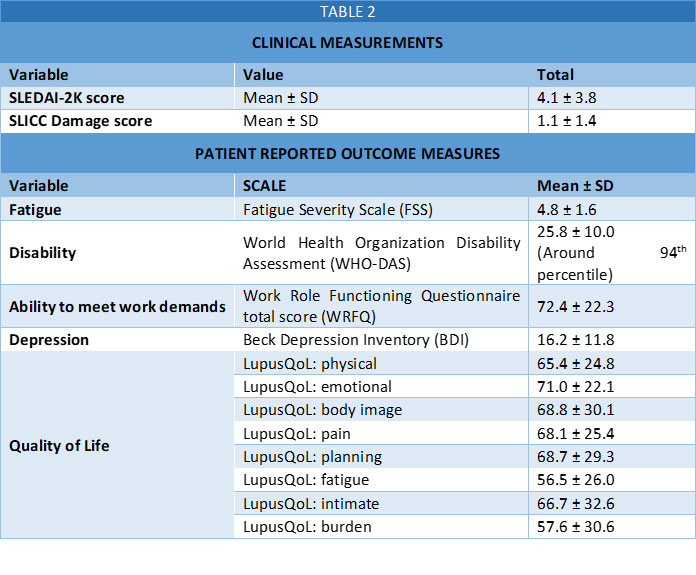Session Information
Date: Sunday, November 13, 2022
Title: SLE – Diagnosis, Manifestations, and Outcomes Poster II: Manifestations
Session Type: Poster Session C
Session Time: 1:00PM-3:00PM
Background/Purpose: Systemic Lupus Erythematosus (SLE) is a chronic, multisystemic, autoimmune disease which can result in disability and mortality. A functional assessment tool that measures the patient’s ability to engage in activities of daily living (ADLs) such as commuting, using technology, or climbing stairs is needed because the inability to carry out these activities translates directly into poor quality of life, leading to poor work performance and absenteeism. The study objective was to describe a functional profile using clinical and patient-reported outcome measures, that identifies the underlying factors of disability and lived-experience in SLE patients.
Methods: A mixed-methods sequential explanatory approach was employed; self-administered questionnaires were used to collect data from patients at 8 Canadian centres (7 academic centres and one community centre), followed by individual interviews. In the first phase, patients who consented were asked to complete the self-administered questionnaires while physicians completed the clinical measures (Table 2). For the second phase, patients were individually interviewed using semi-structured questionnaire to understand their feelings and perspectives on facing the challenges that arise at the workplace due to perceived SLE-related disabilities. The interviews were transcribed verbatim and thematically coded (Figure 1). Summary statistics were computed for demographic, clinical and functional outcomes (Tables 1 and 2).
Results: The sample of 192 patients were mostly female (91.7%), Caucasian (67.2%), with a mean age of 47.6 ± 13.9, and a mean SLE duration of 15.6 ± 12.4 years. (Table 1) The clinical measures showed a SLEDAI-2K score of 4.1 ± 3.8 and an SDI of 1.1 ± 1.4. Patient-Reported Outcome Measures revealed that 22.4% suffered from fibromyalgia, and 32% had depression (defined by BDI score >/= 22); the mean score for the WRFQ was 72.4 ± 22.3, showing that patients experienced important limitations at work; the WHO-DAS 2.0 score of 25.8 is around 94th population percentile, which means only 6.2% of the population score higher (more disabled) than our sample (Table 2).
We identified three preliminary themes including: 1) grit and perseverance in managing their condition (adjusting activities and responsibilities when experiencing flare-ups, changing lifestyle such as diet and exercise) 2) resilient workforce (maintain work activities despite debilitating symptoms, disclosing illness to supervisor, fighting stigma of disease) 3) establishing and maintaining social supports at work (e.g., supportive employers and co-workers, workplace accommodations). The integrated findings provide plausible explanations for high levels of disability experienced.
Conclusion: Our preliminary analyses support the impression that work disability in lupus patients reflect a complex interplay of lupus-related, intrinsic (e.g., comorbidities) and extrinsic (e.g., work environment) factors, for which a functional profile could be of benefit in supporting those at highest risk for poor functional outcomes.
To cite this abstract in AMA style:
Nowrouzi-Kia B, Avina-Zubieta J, Fox M, Shaw W, Ho M, Haaland D, Pope J, Fortin P, Bingham K, Rozenbojm N, Matsos M, Peschken C, Steiman A, Silverman E, Su J, Reynolds J, Ivory C, Gladman D, Urowitz M, Sanchez-Guerrero F, Lim L, Keeling S, Soberanis A, Katz P, Touma Z. Work Disability and Function in Systematic Lupus Erythematosus (SLE): Results from a Mixed-Methods Exploratory Canadian Study [abstract]. Arthritis Rheumatol. 2022; 74 (suppl 9). https://acrabstracts.org/abstract/work-disability-and-function-in-systematic-lupus-erythematosus-sle-results-from-a-mixed-methods-exploratory-canadian-study/. Accessed .« Back to ACR Convergence 2022
ACR Meeting Abstracts - https://acrabstracts.org/abstract/work-disability-and-function-in-systematic-lupus-erythematosus-sle-results-from-a-mixed-methods-exploratory-canadian-study/



